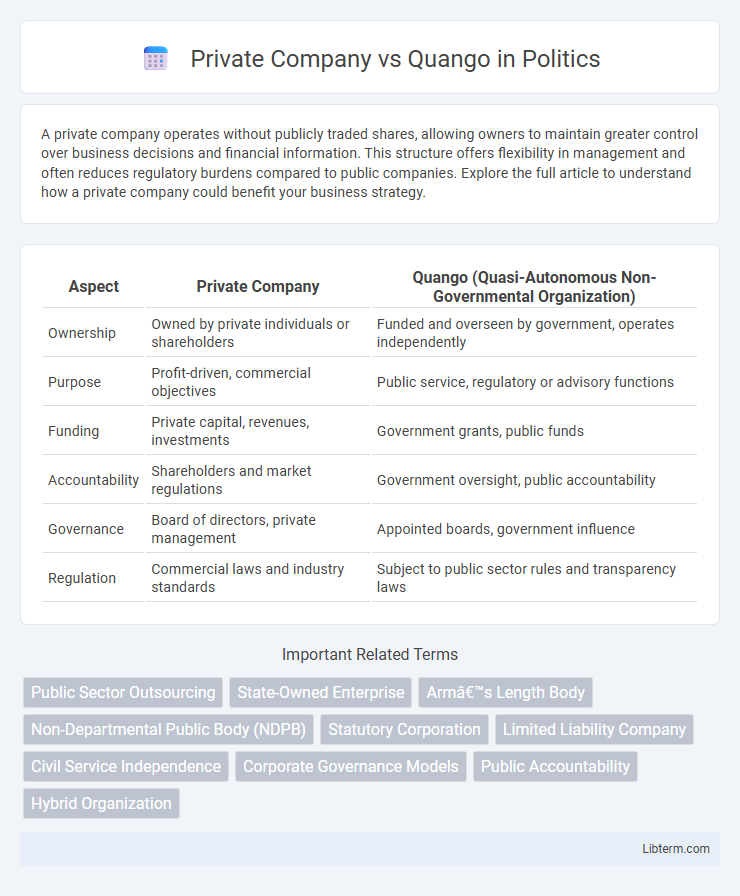A private company operates without publicly traded shares, allowing owners to maintain greater control over business decisions and financial information. This structure offers flexibility in management and often reduces regulatory burdens compared to public companies. Explore the full article to understand how a private company could benefit your business strategy.
Table of Comparison
| Aspect | Private Company | Quango (Quasi-Autonomous Non-Governmental Organization) |
|---|---|---|
| Ownership | Owned by private individuals or shareholders | Funded and overseen by government, operates independently |
| Purpose | Profit-driven, commercial objectives | Public service, regulatory or advisory functions |
| Funding | Private capital, revenues, investments | Government grants, public funds |
| Accountability | Shareholders and market regulations | Government oversight, public accountability |
| Governance | Board of directors, private management | Appointed boards, government influence |
| Regulation | Commercial laws and industry standards | Subject to public sector rules and transparency laws |
Introduction: Understanding Private Companies and Quangos
Private companies are business entities owned by private individuals or groups, operating for profit without public share offerings, while Quangos (Quasi-Autonomous Non-Governmental Organizations) are semi-public bodies funded by government but managed independently. Private companies prioritize shareholder value and market competition, whereas Quangos focus on public service delivery under government oversight. Understanding their distinct governance structures, funding mechanisms, and operational objectives is essential for analyzing their roles in the economy and public sector.
Definitions: What Is a Private Company?
A private company is a business entity owned by private investors or shareholders, not publicly traded on stock exchanges, allowing more control over operations and financial reporting. It operates with limited liability, ensuring owners' personal assets are protected from business debts and liabilities. Unlike quangos, which are quasi-autonomous non-governmental organizations funded by the government to perform specific public functions, private companies focus on profit generation and market competition.
Definitions: What Is a Quango?
A Quango, or Quasi-Autonomous Non-Governmental Organization, is a semi-independent body funded by the government to perform specific public functions without direct governmental control. Unlike private companies, which are owned by private individuals or shareholders and operate for profit, Quangos serve public interests but maintain a degree of operational autonomy. These organizations often oversee regulatory tasks, advisory roles, or service delivery while remaining accountable to government departments.
Legal Status and Regulatory Framework
Private companies operate as independently owned entities governed by corporate law, emphasizing shareholder interests and profit generation. Quangos (Quasi-Autonomous Non-Governmental Organizations) function under statutory or governmental mandates, combining public sector oversight with operational autonomy. Legal status of private companies is defined by commercial registration and corporate governance regulations, whereas quangos are established through specific legislation, subject to public accountability and regulatory frameworks aligned with government policies.
Ownership and Governance Structures
A private company is owned by individual shareholders or private investors, with governance typically handled by a board of directors accountable to these owners. A Quango (Quasi-Autonomous Non-Governmental Organization) operates under government funding and oversight but maintains operational independence, often governed by appointed boards or committees. Ownership in a private company is decentralized among shareholders, whereas Quangos have public accountability through government partnerships and regulatory frameworks.
Funding Sources and Financial Accountability
Private companies primarily rely on equity investments, loans, and revenue from sales as their funding sources, making them financially accountable to shareholders and creditors. Quangos, or quasi-autonomous non-governmental organizations, receive significant funding from government grants and public funds, necessitating strict financial accountability to public sector audit bodies and government regulators. The differing funding sources shape their financial transparency requirements, with private companies focusing on investor returns and quangos emphasizing public accountability and compliance with government financial rules.
Roles and Functions: Private Sector vs Quasi-Government
Private companies operate primarily to generate profit by providing goods or services in competitive markets, driving innovation and efficiency through shareholder incentives. Quangos (Quasi-Autonomous Non-Governmental Organizations) perform public functions on behalf of the government, delivering services or regulatory oversight while maintaining operational independence. Unlike private companies, quangos prioritize public accountability and policy implementation over profit, bridging the gap between government and the private sector.
Transparency and Public Accountability
Private companies operate with limited transparency, as they are not obligated to disclose detailed financial or operational information to the public, restricting public accountability primarily to shareholders. Quangos (Quasi-Autonomous Non-Governmental Organizations) receive public funding and are subject to government oversight, which mandates higher transparency and accountability standards, including detailed reporting and audits. This structural difference ensures quangos remain more accountable to public interests, while private companies prioritize stakeholder confidentiality.
Advantages and Disadvantages of Each Model
A private company offers greater operational flexibility, faster decision-making, and profit-driven incentives but faces challenges like limited public accountability and reliance on private funding. A Quango (Quasi-Autonomous Non-Governmental Organization) benefits from public funding, regulatory oversight, and stable long-term objectives yet often experiences bureaucratic delays, reduced innovation, and less financial independence. Comparing both, private companies excel in efficiency and market responsiveness, while Quangos offer transparency and alignment with public policy goals.
Choosing Between Private Company and Quango: Key Considerations
Choosing between a private company and a Quango depends on the desired level of government involvement and operational autonomy. Private companies operate with full commercial independence and profit-driven motives, while Quangos are semi-autonomous organizations funded or overseen by government bodies, balancing public accountability with limited operational freedom. Key considerations include regulatory compliance, funding sources, governance structures, and the strategic objectives of the organization.
Private Company Infographic

 libterm.com
libterm.com